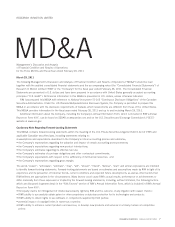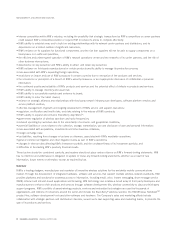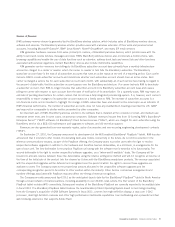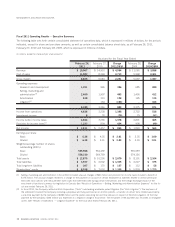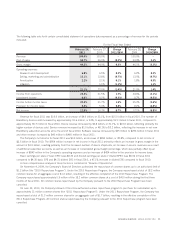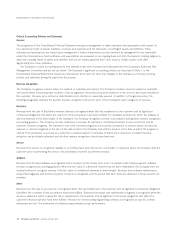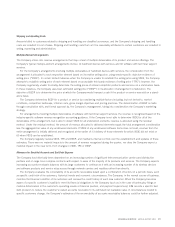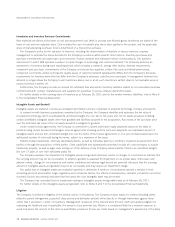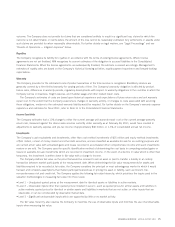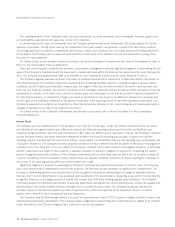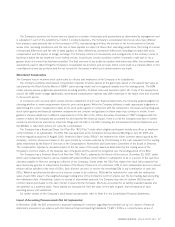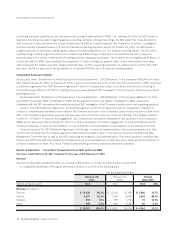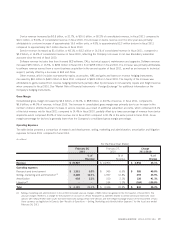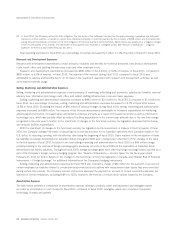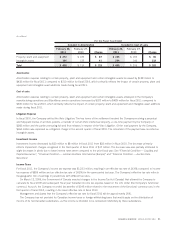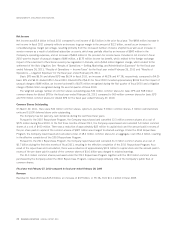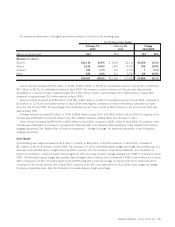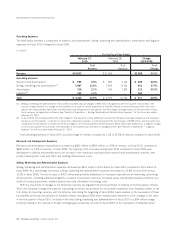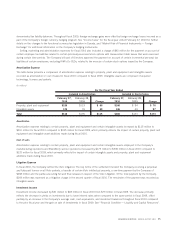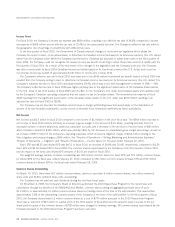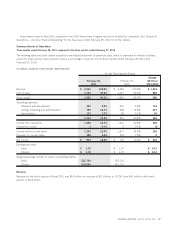Blackberry 2011 Annual Report Download - page 30
Download and view the complete annual report
Please find page 30 of the 2011 Blackberry annual report below. You can navigate through the pages in the report by either clicking on the pages listed below, or by using the keyword search tool below to find specific information within the annual report.The Company’s provision for income taxes is based on a number of estimates and assumptions as determined by management and
is calculated in each of the jurisdictions in which it conducts business. The Company’s consolidated income tax rates have differed
from statutory rates primarily due to the tax impact of ITCs, manufacturing activities, the amount of net income earned in Canada
versus other operating jurisdictions and the rate of taxes payable in respect of those other operating jurisdictions, the timing of reversal
of temporary differences and the rate of taxes applied on these differences, permanent differences including non-deductible stock
compensation and the impact of foreign exchange. The Company enters into transactions and arrangements in the ordinary course of
business in which the tax treatment is not entirely certain. In particular, certain countries in which it operates could seek to tax a
greater share of income than has been provided. The final outcome of any audits by taxation authorities may differ from estimates and
assumptions used in determining the Company’s consolidated tax provision and accruals, which could result in a material effect on the
consolidated income tax provision and the net income for the period in which such determinations are made.
Stock-Based Compensation
The Company has an incentive stock option plan for officers and employees of the Company or its subsidiaries.
The Company estimates stock-based compensation expense for stock options at the grant date based on the award’s fair value as
calculated by the Black-Scholes-Merton (“BSM”) option-pricing model and is recognized rateably over the vesting period. The BSM
model requires various judgmental assumptions including volatility, forfeiture rates and expected option life. If any of the assumptions
used in the BSM model change significantly, stock-based compensation expense may differ materially in the future from that recorded
in the current period.
In connection with its stock option review and the restatement of prior year financial statements, the Company applied judgment in
choosing whether to revise measurement dates for prior option grants. While the Company believes it made appropriate judgments in
determining the correct measurement dates for its stock option grants in connection with the restatement, the issues surrounding past
stock option grants and financial statement restatements are complex and guidance in these areas may continue to evolve. If new
guidance imposes additional or different requirements or if the SEC or the Ontario Securities Commission (“OSC”) disagrees with the
manner in which the Company has accounted for and reported the financial impact, there is a risk the Company may have to further
restate its prior financial statements, amend its filings with the SEC or the OSC (including the Consolidated Financial Statements and
this MD&A), or take other actions not currently contemplated.
The Company has a Restricted Share Unit Plan (the “RSU Plan”) under which eligible participants include any officer or employee
of the Company or its subsidiaries. The RSU Plan was approved at the Company’s Annual General Meeting on July 18, 2005 and
received regulatory approval in August 2005. Restricted Share Units (“RSUs”) are redeemed for either common shares issued by the
Company, common shares purchased on the open market by a trustee selected by the Company or the cash equivalent on the vesting
dates established by the Board of Directors or the Compensation, Nomination and Governance Committee of the Board of Directors.
The compensation expense is calculated based on the fair value of the equity award as determined by the closing value of the
Company’s common shares on the business day of the grant and the amount is recognized over the vesting period of the RSU.
The Company has a Deferred Share Unit Plan (the “DSU Plan”), adopted by the Board of Directors on December 20, 2007, under
which each independent director will be credited with Deferred Share Units (“DSUs”) in satisfaction of all or a portion of the cash fees
otherwise payable to them for serving as a director of the Company. Grants under the DSU Plan replace the stock option awards that
were historically granted to independent members of the Board of Directors. At a minimum, 50% of each independent director’s annual
retainer will be satisfied in the form of DSUs. Each director can elect to receive the remaining 50% in any combination of cash and
DSUs. Within a specified period after such a director ceases to be a director, DSUs will be redeemed for cash with the redemption
value of each DSU equal to the weighted average trading price of the Company’s common shares over the five trading days preceding
the redemption date. Alternatively, subject to receipt of shareholder approval, the Company may elect to redeem DSUs by way of
common shares purchased on the open market or issued by the Company. DSUs are accounted for as liability-classified awards and
are awarded on a quarterly basis. These awards are measured at their fair value on the date of grant, and remeasured at each
reporting period, until settlement.
For further details on the Company’s stock-based compensation, refer to Note 9 to the Consolidated Financial Statements.
Impact of Accounting Pronouncements Not Yet Implemented
In November 2008, the SEC announced a proposed roadmap for comment regarding the potential use by U.S. issuers of financial
statements prepared in accordance with International Financial Reporting Standards (“IFRS”). IFRS is a comprehensive series of
RESEARCH IN MOTION ANNUAL REPORT 2011 17


